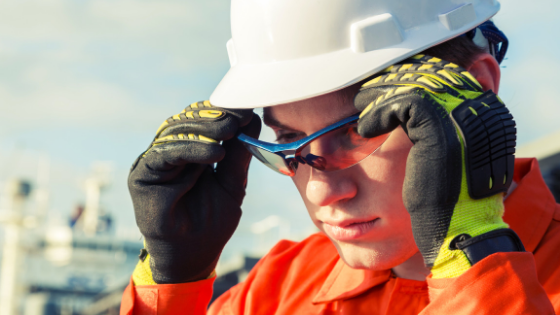In today’s post, we’ll be discussing an important question: can your employer make you wear safety glasses? We’ll explore the pros and cons of this safety measure, and help you decide if it’s right for you.
Can my employer make me wear safety glasses?
Most employers require their employees to wear safety glasses while on the job. While the Occupational Safety and Health Administration (OSHA) does not have a specific regulation requiring the use of safety glasses, they do require the use of personal protective equipment (PPE) to protect workers from hazards.
The legal requirements for safety glasses in the workplace
Most workplaces will require employees to wear some form of protective eyewear if there is a risk of eye injury. This could include safety glasses, goggles, or a full-face shield. The type of protective eyewear required will depend on the nature of the work being done and the potential hazards present.
There are several different standards for safety eyewear, including the American National Standards Institute (ANSI) and the Occupational Safety and Health Administration (OSHA). Employers are responsible for providing employees with protective eyewear that meets the relevant standards.
Safety glasses are typically made of shatter-resistant polycarbonate or acrylic and have side shields to protect against flying debris. Some styles also have an anti-fog coating to prevent lenses from steaming up in humid or warm conditions.
Goggles are a type of protective eyewear that fit snugly around the eyes and provide additional protection against dust, chemicals, or liquids. Full-face shields offer the highest level of protection, covering the entire face in a clear plastic sheet.
Employers should consult the relevant safety regulations to determine what type of protective eyewear is required for their workplace. Employees who wear prescription glasses can usually find safety glasses that fit over their existing lenses.
The benefits of wearing safety glasses at work
There are many benefits to wearing safety glasses at work. First, they can help protect your eyes from hazardous materials or flying debris. Second, they can help improve your visibility in low-light or dark conditions. Third, they can help reduce eye fatigue and strain. fourth, they can help you stay focused on your work. Finally, they can help you avoid potential accidents and injuries.
The risks of not wearing safety glasses at work
Working without proper safety gear can put you at risk for serious injury, and that includes not wearing safety glasses when required.According to the Occupational Safety and Health Administration (OSHA), there are more than 700,000 eye injuries that occur in workplaces each year, and many of these could have been prevented if the workers had been wearing safety glasses.
Most eye injuries that occur on the job are due to flying objects or debris, chemical Splashes, or welding sparks. Any of these can cause serious damage to your eyesight, including blindness. Wearing safety glasses can help protect your eyes from these dangers.
Some employers require their workers to wear safety glasses at all times while on the job, while others only require them when there is a potential hazard present. Either way, it is important to follow your employer’s policy on wearing safety glasses. Failure to do so could result in an accident that could injure you or someone else.
How to choose the right safety glasses for your job
Your employer is required by law to provide a safe and healthy workplace. This includes protecting you from materials and substances that could harm your eyes. Your employer must also provide the necessary personal protective equipment (PPE), which may include safety glasses, to protect you from these hazards.
There are different types of safety glasses available, so it’s important to choose the right ones for your job. Here are some factors to consider:
-The type of hazard you will be exposed to: There are different types of safety glasses designed to protect against different types of hazards. For example, impact-resistant safety glasses offer protection from flying debris, while chemical-resistant safety glasses offer protection from corrosive substances.
-The fit: Safety glasses should fit comfortably and securely on your face. They should not impede your vision or hearing in any way.
-The style: Safety glasses come in a variety of styles, including wrap-around, half-frame, and frameless. Choose the style that best suits your needs and preferences.
If you have any questions about choosing the right safety glasses for your job, talk to your employer or health and safety representative.
How to care for your safety glasses
Safety glasses are an important part of many jobs, and it’s important to take care of them to ensure that they last. Here are some tips on how to care for your safety glasses:
-Wash them regularly with soap and water.
-Don’t use harsh chemicals or cleaners on them.
-Be careful when handling them – don’t drop or sit on them.
-Store them in a safe place when not in use.
Tips for wearing safety glasses at work
Safety glasses are a necessary part of many jobs, but they can be a pain to wear. If you find yourself constantly pushing your glasses up or readjusting them, here are a few tips to help you keep them in place:
-Try different styles of safety glasses. There are many different varieties available, so you may need to experiment to find the ones that work best for you.
-Make sure your glasses fit properly. They should sit comfortably on your nose and ears without being too loose or too tight.
-If possible, attach the strap that comes with most safety glasses. This will help keep them in place even if you sweat or move around a lot.
-Adjust the temples (the arms of the glasses that go over your ears). The temples should be tight enough that the glasses don’t fall off but not so tight that they’re uncomfortable.
-Wear a hat or other headwear if possible. This will help keep your safety glasses in place and prevent them from slipping down your nose.
FAQs about safety glasses in the workplace
While most employers require employees to wear some sort of safety gear on the job, safety glasses are one of the most common items. If you have questions about whether or not your employer can make you wear safety glasses, here are some answers to frequently asked questions.
Can my employer make me wear safety glasses?
Yes, in most cases, your employer can require you to wear safety glasses while working. However, there are a few exceptions. For example, if you have a medical condition that prevents you from wearing glasses or if wearing glasses would pose a greater hazard than not wearing them, your employer may not require you to wear them.
What should I do if I don’t want to wear safety glasses?
If you have a medical condition that prevents you from wearing glasses or if you believe that wearing them would pose a greater hazard than not wearing them, you should talk to your supervisor about your concerns. He or she may be able to provide an accommodation that would allow you to work safely without wearing glasses.
Can I be fired for refusing to wear safety glasses?
In most cases, yes. If your refusal to wear safety glasses puts yourself or others at risk, your employer is within their rights to terminate your employment.












